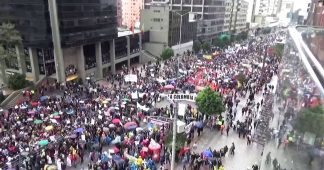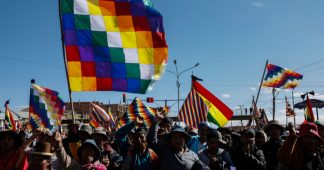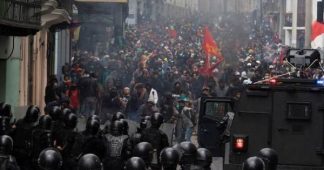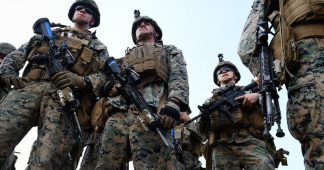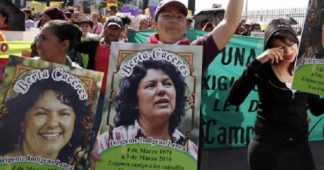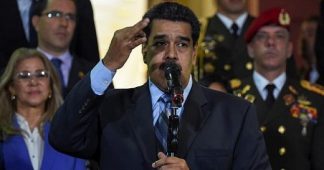By Seth Galinsky
Days after hundreds of thousands of union workers, students, indigenous and farmers joined anti-government actions across Colombia, protests and strikes continued in Bogota Nov. 25.
A wave of protests by working people is shaking capitalist regimes from Chile to Ecuador to Colombia today. And they are a challenge to Washington’s progress in asserting its imperialist sway in the hemisphere.
New governments elected in Ecuador and Brazil in the last two years forced out Cuban internationalist medical volunteers from their countries, and joined in the U.S. rulers’ slander campaign against the Cuban Revolution. In August 2018 President Lenin Moreno pulled Ecuador out of the Cuban- and Venezuelan-led ALBA trade alliance, which serves as a counterweight to Washington’s exploitative “free trade” pacts.
And on Nov. 10, rightist forces in Bolivia succeeded in ousting President Evo Morales, opening the door to deeper attacks on working people and indigenous farmers there.
But the ongoing worldwide capitalist economic crisis is destabilizing governments across Latin America. The foreign debt of Latin American and Caribbean governments has nearly doubled since 2010 to some $2.5 trillion. There is no end in sight to the crisis that imperialism itself is preparing.
The government of Colombian President Iván Duque is the latest to be shaken by mass protests. Hundreds of thousands of union workers, students, indigenous and farmers took to the streets around the country Nov. 21 to protest Duque’s government and its policies.
For decades the Colombian government has been one of Washington’s closest allies, working closely with the Pentagon and aiding the U.S. rulers’ campaign against the government of Nicolás Maduro in neighboring Venezuela.
‘No confidence in Colombian gov’t’
“The people have no confidence that the president will solve the grave problems we face,” small coffee farmer Rubén Dario Cifuentes told the Militant by phone from Cauca province Nov. 23.
Official unemployment is nearly 11%. In early November, Defense Minister Guillermo Botero resigned following revelations that the military had covered up the killing of at least eight children when the army attacked a small band of guerrillas.
Colombian labor unions called for the Nov. 21 protest in October. Inspired by large anti-government actions in Ecuador and Chile, support for the action took off.
Duque responded by ordering the closing of border crossings and deporting 24 Venezuelans he claimed were instigating unrest. He deployed some 170,000 cops and soldiers around the country. But the fear and intimidation campaign didn’t work.
One big issue is so-called government pension reform, Alberto Solando Cordero, a mine worker official of the Sintramienergética union, told the Militant two days after the protest.
In Colombia “you have to work 1,200 weeks to qualify for your full pension,” Solando said. Under the “reform,” if you work less than 40 hours it would no longer be counted as a full week, forcing workers to wait longer to retire. Millions never qualify for even the paltry sums the government currently pays out.
It’s not just the economy. “The government has not been carrying out the peace accords,” Solando said, referring to the 2016 agreement the Colombian rulers signed with FARC guerrillas in talks mediated by Cuba. The agreement was hailed by workers and peasants and created greater political space.
The government has reneged on promises to provide land for former guerrillas, aid for farming, and housing, he said. Some of the former guerrillas have taken up arms again and are collaborating with drug traffickers.
“The biggest problem we have is that the state is carrying out the demands of the International Monetary Fund and the World Bank, with evil consequences,” César Pachón, a leader of Dignidad Papera, an organization of small potato farmers, told the Militant from Boyacá. “And the ‘free trade’ pact with the U.S. has just deepened the crisis.”
“Peasants don’t want to be criminals,” Pachón said, “but many end up growing illicit coca, because they can’t survive on the price they get for coffee, sugar cane, milk or potatoes.”
Most of what Colombia exports is agricultural produce or raw materials. Finished products are then imported at high prices, sinking the country deeper in debt.
Colombia is one of the top four milk producing countries in Latin America and the Caribbean. “But we import powdered milk from the U.S. because we don’t have a factory to produce it,” Pachón said.
At least 52 indigenous people have been killed in Cauca so far this year. Hundreds of other activists have been killed around the country. “In Cauca they have been killed by drug gangs. The indigenous people have their own guards to prevent trafficking because the government authorities do nothing,” Pachón said.
“The protests are going to continue,” Pachón said.
Chile: 30 years of abuse
Chile has been a symbol of the success U.S. imperialism has had in imposing its will on Latin America. In 1973 a CIA-instigated coup overthrew Salvador Allende — elected president three years before at a time of ascending working-class struggles — and imposed a reign of terror headed by Gen. Augusto Pinochet.
In 1988 Pinochet held a referendum to put the stamp of approval on another eight years of his regime. But it was defeated, leading to new elections. Successive capitalist governments restored “democracy,” but kept in place or deepened the anti-working-class economic and social measures initiated under Pinochet’s regime.
On Oct. 25, a series of protests against the government culminated with some 1.2 million people jammed into central Santiago. The protests began when high school youth took to the streets against a 30 peso (42 cents) increase in subway fares. “It’s not about 30 pesos. It’s about 30 years,” protesters said, highlighting the pent-up anger over decades of attacks.
“It was the largest protest since the 1989 return of democracy,” Enrique Solar, an official of the Port Workers Union of Chile, told the Militant. “Everything exploded. It’s been 30 years of injustice.”
Chileans often denounce the two-tier health care system, one for working people, the other for the better off. “The public health system is terrible,” Solar said. “You can die waiting for them to give you an appointment for an operation. But if you have money, you get attention in 10 minutes at a private clinic.”
When the recent round of protests broke out, Chilean President Sebastián Piñera, a Harvard-educated billionaire, declared the country was “at war.” The police attacked protesters with tear gas, high pressure water streams, and “rubber” bullets, which turned out to have less than 20% rubber.
At least 285 protesters lost an eye or had severe trauma from being shot in the face at close range by the cops. More than 20 demonstrators were killed, “and there’ve been disappeared,” Solar said.
With the repression just fueling anger, Piñera decided to try economic concessions. He announced he would raise pensions for the poorest by 20%, increase the minimum wage by 16%, cancel a 9.2% hike in electricity rates and cut the cost of medicines. And he proposed cutting the pay of legislators, who earn a minimum of $27,000 a month.
But it’s too little, too late, Solar said.
Like in Colombia and Ecuador, the traditional capitalist rulers are discredited. “The people are fed up with all the parties,” he said.
Published at https://themilitant.com/2019/11/29/protests-in-colombia-chile-resist-government-attacks/
